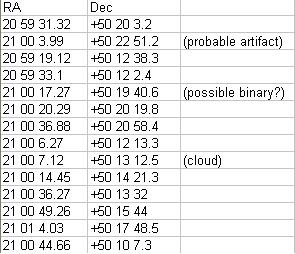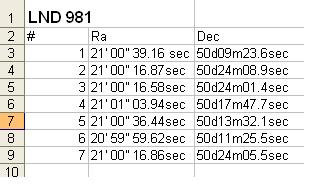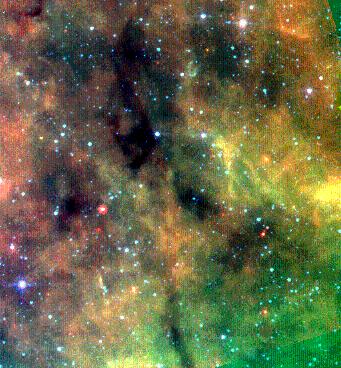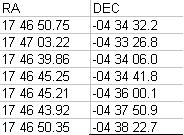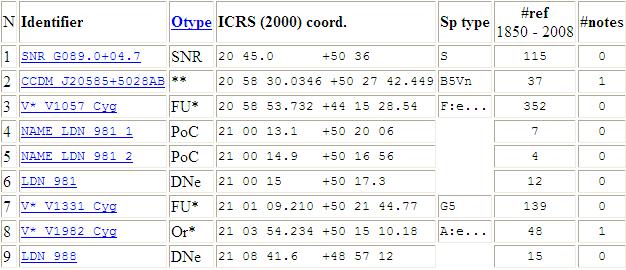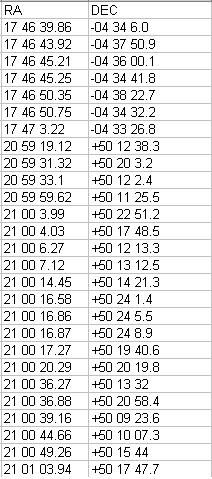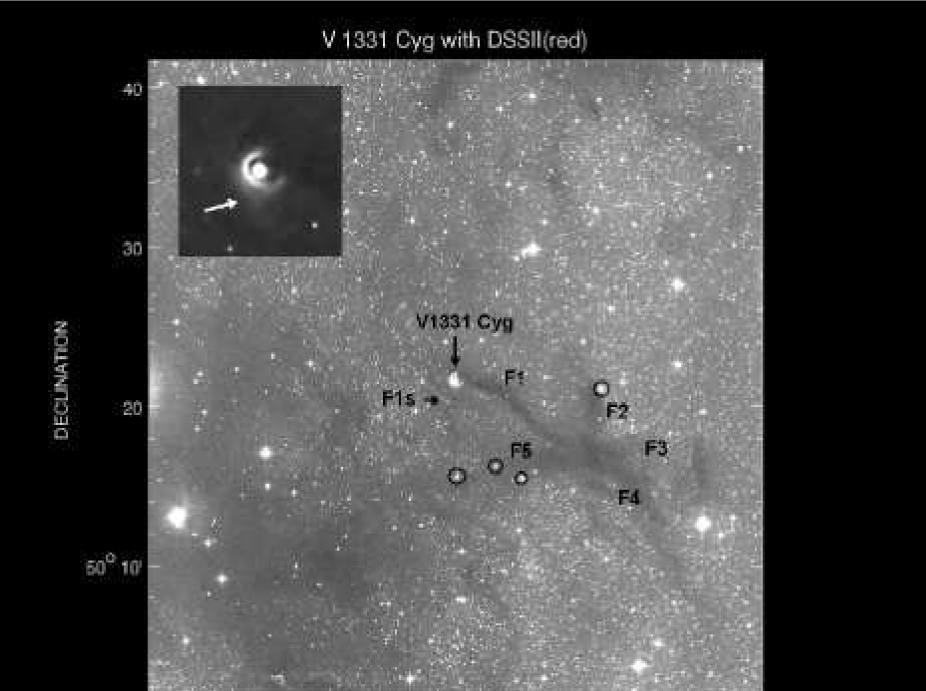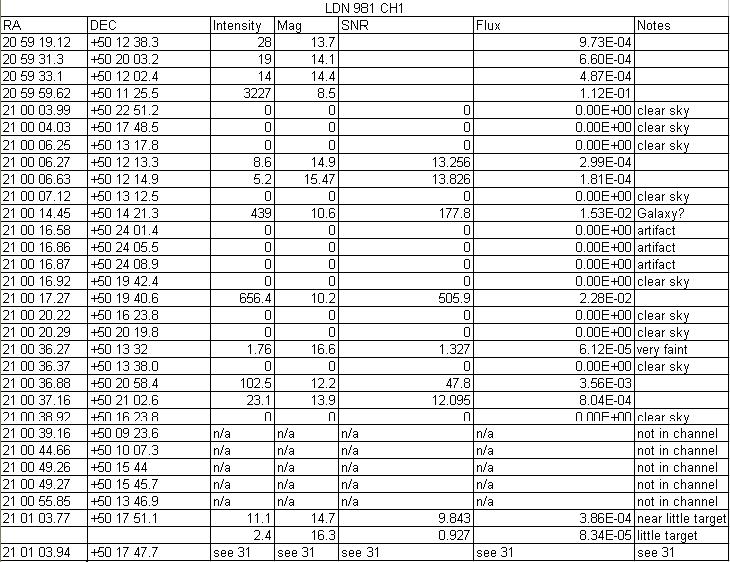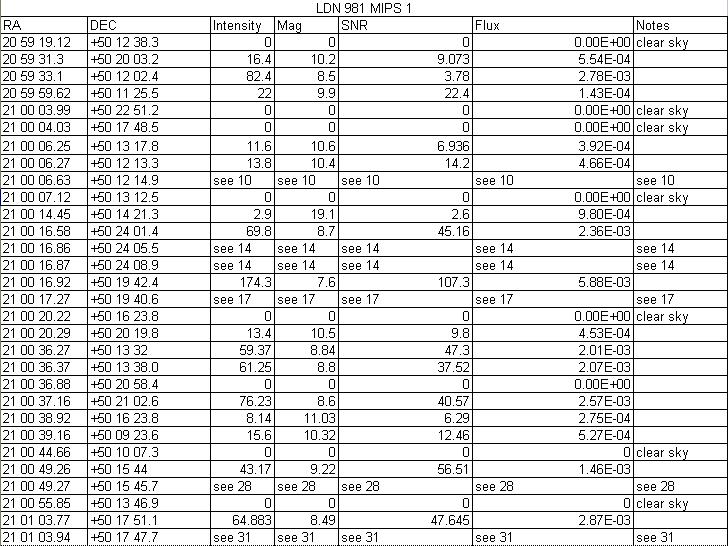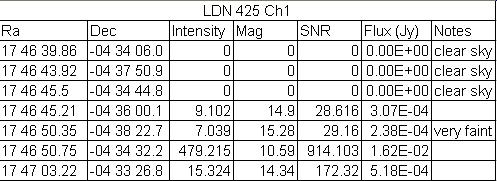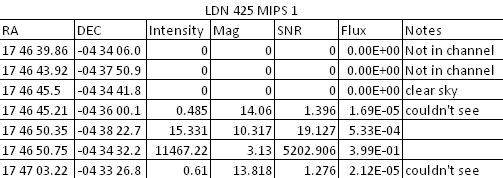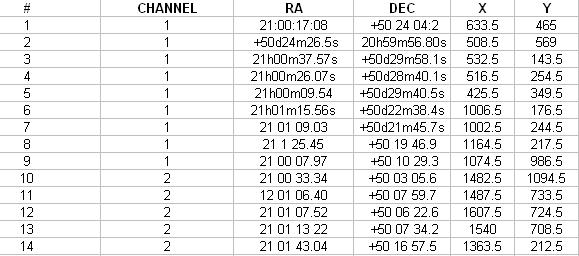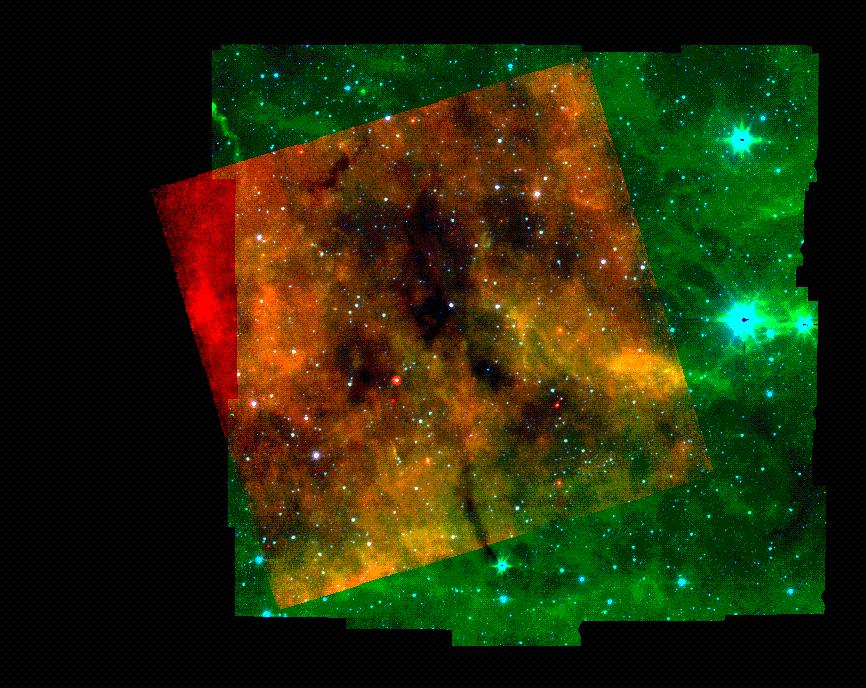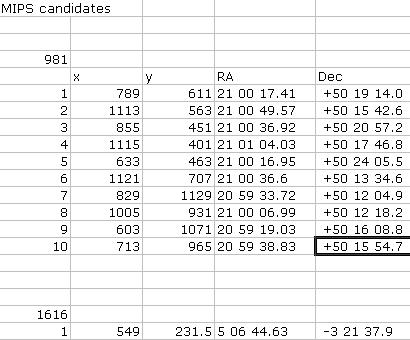Talk:Data Analysis of LDN425 and LND981
Contents
Oil City Discussion
--Spuck 09:26, 15 October 2008 (PDT) We have the following software working on our computers - Spot, Leopard, Mopex, MaxIm DL, and DS-9.
--Spuck 09:30, 15 October 2008 (PDT) We used Leopard to downloaded all of the PBCD data for our Spitzer observations of LDN425 and LND981. We have started to do some visual inspection of the images, and making color composite images.
--JButchart 3:15, 15 October 2008 (PDT) Shana and I looked through the LDN 981 data on Mopex and found some points of interest.. they are the following:
--AlixHolcomb 05:21, 22 October 2008 (PDT) I look through the LDN 981 data on Mopex as well and found a few points of interest. They are as follows:
--AlixHolcomb 05:33, 22 October 2008 (PDT)I also made some pretty sweet color composite images of LDN 981 using Mopex. Ch4(Green) Ch3(Red) Ch1(Blue):
--skennedy 5:02, 23 October 2008 (PDT) This is my list of interesting objects in LDN 425 that I found in several different color composites.
--Jbutchart 05:36, 28 October 2008 (PDT) I thought I would put up a festive color composite to celebrate Halloween and fall! Also, the spot at 21h 00m 07s, +50d 13m 04s can be seen quite well.
--Skennedy 05:51, 29 October 2008 (PDT) I found some information about a star previously known in LDN 981. Here's the abstract from the Astrophysical Journal.
ABSTRACT We characterize the small- and large-scale environment of the young star V1331 Cygni with high-resolution HST WFPC2 and Digitized Sky Survey images. In addition to a previously known outer dust ring (≈ in diameter), the WFPC2 scattered light image reveals an inner dust ring for the first time. This ring has a maximum radius of ≈ and is possibly related to a molecular envelope. Large-scale optical images show that V1331 Cyg is located at the tip of a long dust filament linking it to the dark cloud LDN 981. We discuss the origin of the observed dust morphology and analyze the object's relation to its parent dark cloud LDN 981. Finally, based on recent results from the literature, we investigate the properties of V1331 Cyg and conclude that in its current state the object does not show sufficient evidence to be characterized as an FU Ori object.
--JenniferButchart 10:49, 29 October 2008 (PDT) I got on ADS today and found the same article (by Quanz, S. P.; Apai, D.; Henning, Th.) titled Dust Rings and Filaments around the Isolated Young Star V1331 Cygni. It is the same one as Shana found. I do believe these are the points they identified:
--Sandy 13:22, 30 October 2008 (PDT) This is sandy's test comment.
--JenniferButchart 05:29, 31 October 2008 (PDT) I just read that entire article on astro-ph (found here: astro-ph) and it says V1331 Cyngi is, mostly likely, the only star that has formed in LDN 981 (it formed in isolation). However, they stated that stars may form along the filaments of the cloud since it it undergoing a graviational collapse.
--AlixHolcomb 11:26, 31 October 2008 (PDT)So I know it was like hours ago, but Spuck wanted someone to post about our video confrence. So I decided too. We established that the Oil City team needs to start making SED's and color color plots. I'm currently trying to conquer FITS liberator so that our color composite images turn out not as pixilated and a little less generic RBG. I'm sorta getting the handle of everything. I"ll post later.
--JenniferButchart 21:07, 1 November 2008 (PDT) Alix, I posted about the video conference [with screen shot] under the video conference section right after we hung up.
--Rachele 10:43, 4 November 2008 (PST) Jenni and I collected everyone's points of interest. We generated this table and will soon have x coordinates, y coordinates, magnitudes and intensities. This is in increasing order of RA.
--JenniferButchart 02:34, 16 November 2008 (PST) Here are the previously identified targets in LDN 981... (Don't ask why I'm up so late.. I love Arizona!)
--JenniferButchart 15:47, 30 November 2008 (PST) Just a little update... We are working on getting all of the intensity, magnitude, and flux (Jy) values for all of the interesting targets in LDN 425 and LDN 981 (in IRAC 1, 2, 3, 4 and MIPS 1). We are using MaxIM DL for this procedure. We have a master spreadsheet that we will post when completed.
--JenniferButchart 05:39, 3 December 2008 (PST) Here are all of my charts for LDN 981 in IRAC 1 and Mips 1. All of the targets are taken from what everyone posted.
--JenniferButchart 06:58, 3 December 2008 (PST) I'm back again... I looked at what Luisa thought were interesting targets, and I found that some of ours correspond with hers. They aren't exact, but they're pretty close. They are:
Ra/Dec
20 59 33.1/50 12 02.4
21 00 17.27/50 19 40.6
21 00 37.16/50 21 02.6
21 00 49.26/50 15 44
21 00 49.27/50 15 45.7
Manhasset Discussion
Students in class have identified the following points of interest in LDN 981. Leopard was used to determine these candidates but MOPEX, ATP, and Spot are also downloaded and installed.
The primary criteria for choosing these candidates was IR excess and oversaturated pixels.
Of the 14 candidates above, we found references for 6 candidates: candidates 1, 3, 6, 7, 11, and 13.
We followed Mr. Spuck's directions and came up with an overlay of 3 wavelengths: MIPS 24 in red, IRAC 8 in green, and IRAC 4.5 in blue. We located the stars that appeared to have a red ring (dust) and added them to our list of candidates.
Here is the list of candidates we found using this method of overlaying:
--Wassmer 05:51, 5 December 2008 (PST)here is Ashley's data
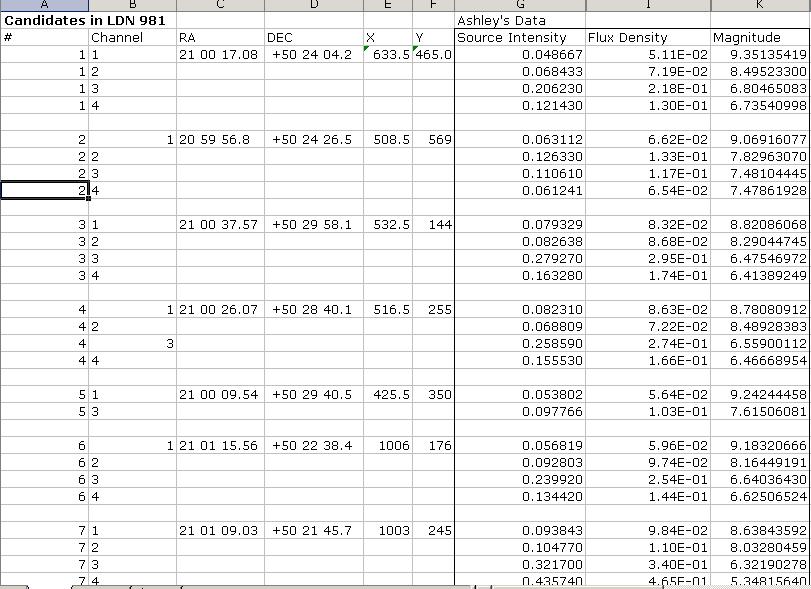
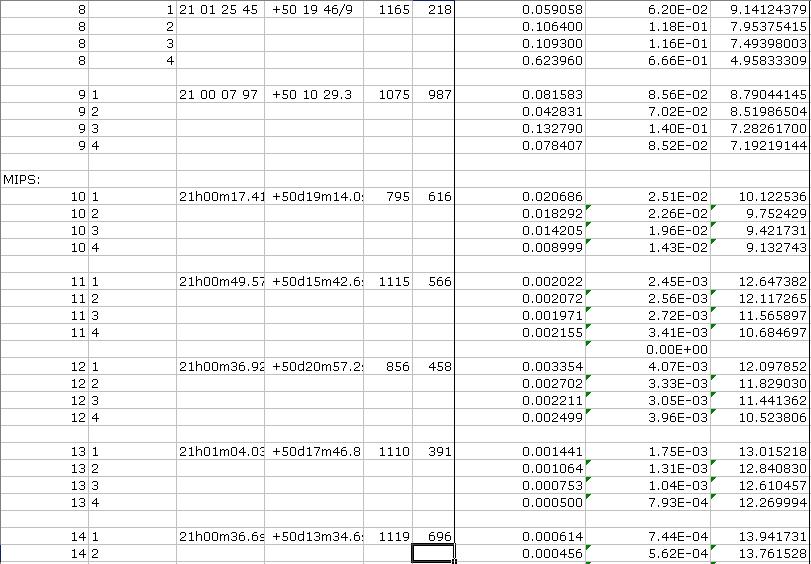
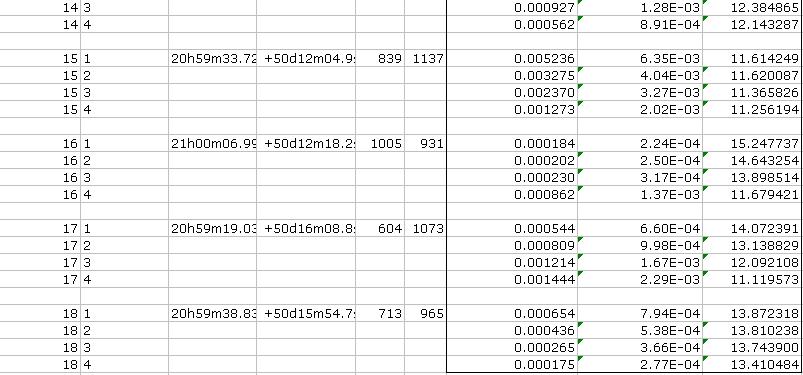
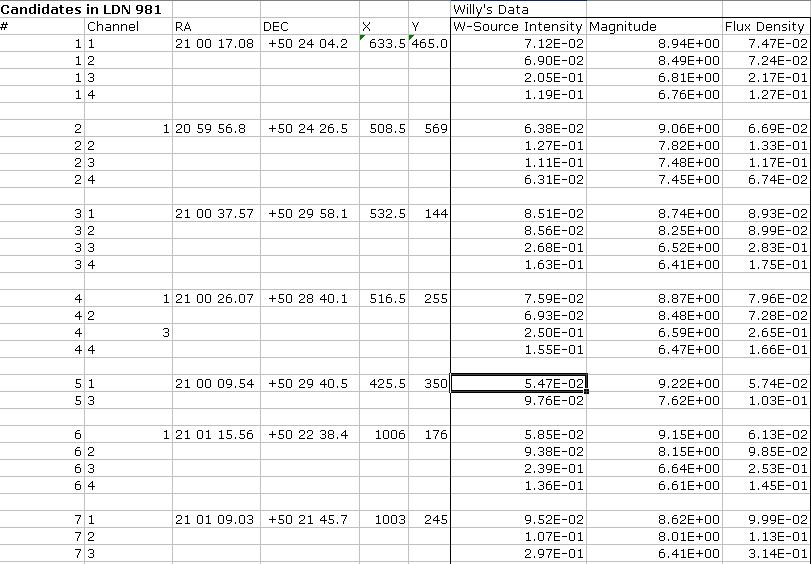

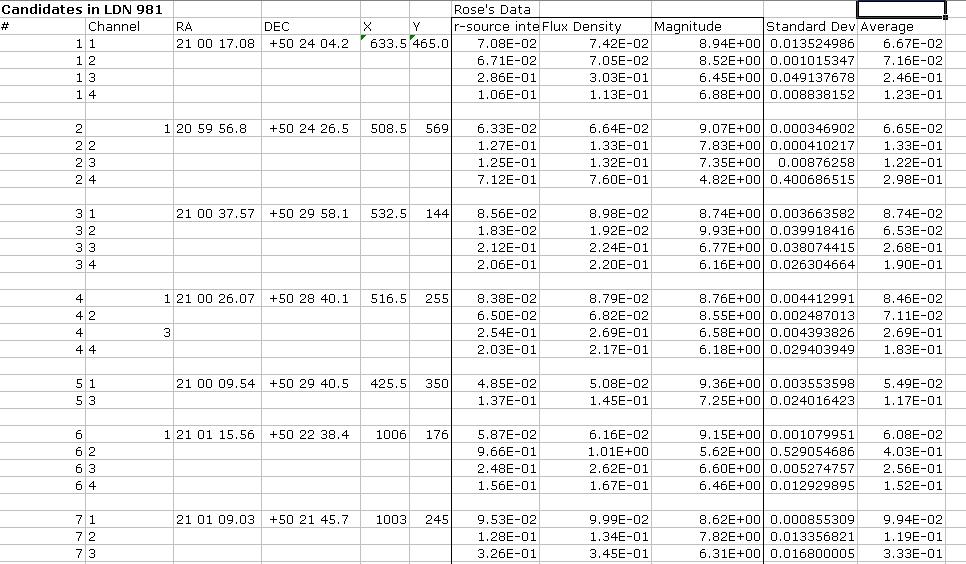

Chippewa Hills Discussion
We have Spot and Leopard installed in our science department lab at school. They have been updated to the most recent version. Mopex is also installed and updated. APT will be done soon.
All PBCD data for both dark nebulae have been downloaded as well. We will look at what's been done at Oil City and Manhasset and see if we see the same points of interest, possibly identifying additional (if any) ones.
We now have a short list of additional points of interest. We believe that there may be more and I will have my astronomy students looking this coming week during class. Justin and Trevor are in this class and will be working with the other students to help them see what we are looking for.
 --Dewolf 15:20, 8 November 2008 (PST)
--Dewolf 15:20, 8 November 2008 (PST)
